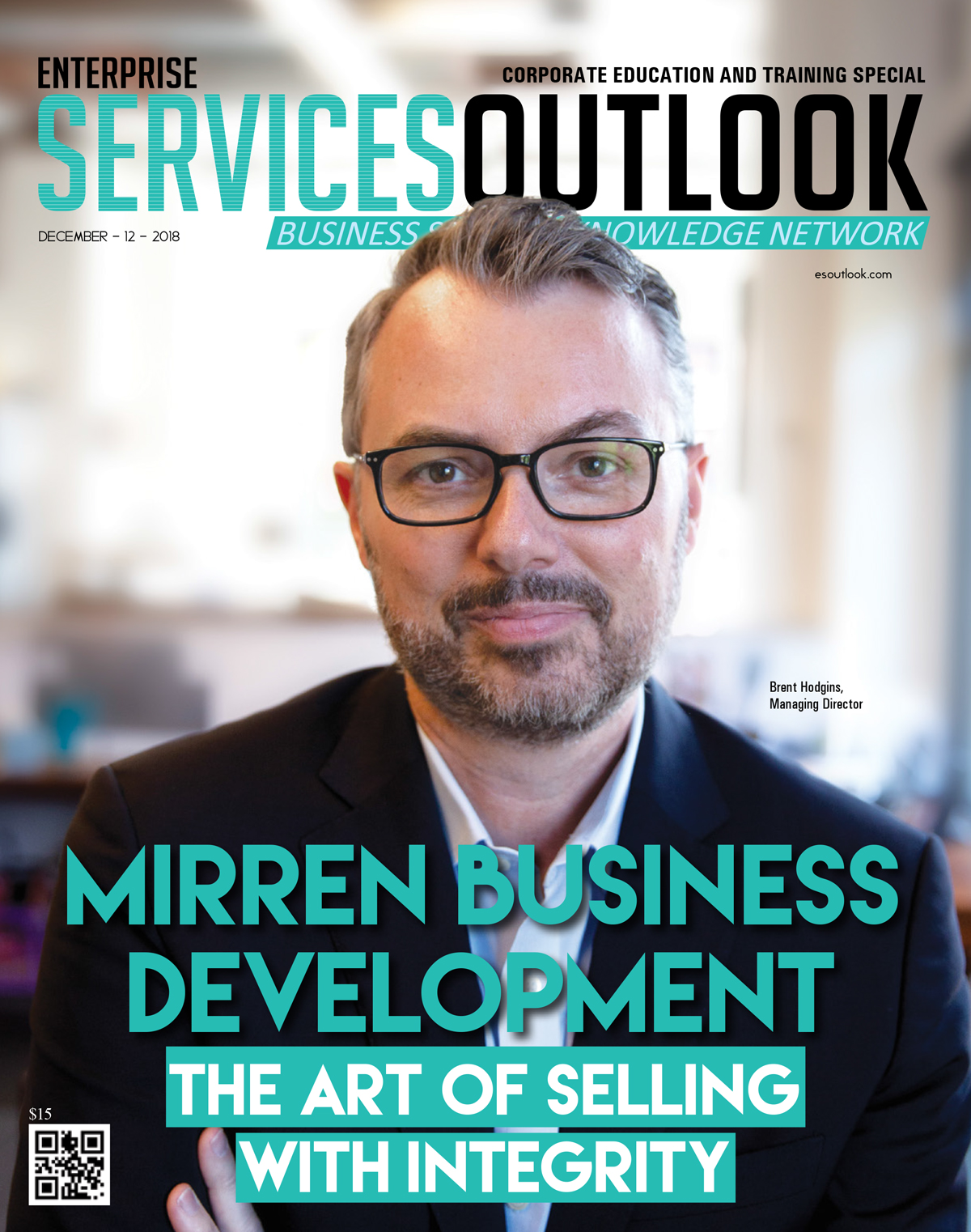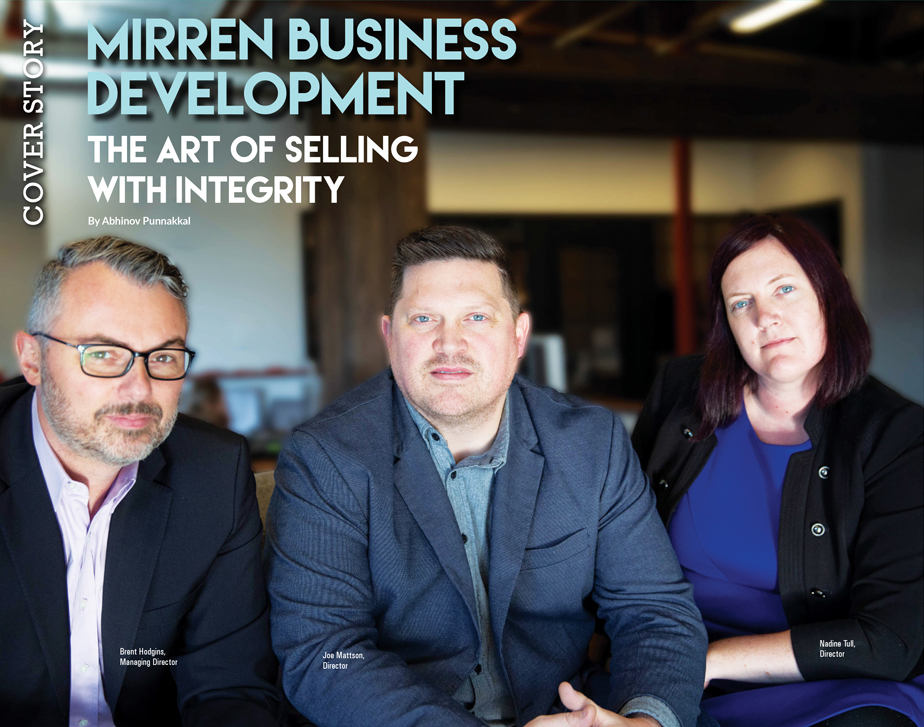
Mirren Business Development
Mirren Named Top 10 U.S Training Firm
Based On Training Innovation & Client Impact, Mirren Has Been Named One of the Most Sophisticated Training FIrms in the Country
The Art of Selling With Integrity
A Cover Story Article on Enterprise Services Outlook By Abhinov Punnakkal
Are You Focused on Your Prospect’s Business Growth—or Simply Talking to Yourself?
Mirren is a sales training firm that helps sales executives convert more business by better correlating their offering to their prospects’ business growth.
The key to their effectiveness is in addressing the fact that senior decision-makers are being held accountable for tangible business impact like never before. No matter who you sell to, your prospect must justify every dollar they spend on outsourced services. Everyone must build a case for the role their budget will play in contributing to their organization. And it’s black and white for your sales teams: play a role in supporting this mandate or don’t.
Most Sales Teams Do Not
Most sales executives ramble on about their products and services in a self-indulgent (almost narcissistic) manner with no regard for what really matters to the prospect. Everyone believes they’re selling something unique, so, of course, who wouldn’t want to hear all about it. Not so.
For example, in technology sales, the pitch might be about “faster processing power,” “leveraging the cloud,” or “real-time integration.” These are features, not benefits. Features are all about your offering. Benefits are about how it will impact your prospect’s business in a way that is meaningful to them. Features matter to you. Benefits matter to your prospects.
Even pushing it further to “modernize your business” or “create more time to do the things that matter” isn’t enough. They’re generic industry clichés, not speaking specifically enough to the unique needs of each prospect’s business.
Poorly Written RFP Assignments Make Matters Worse
RFPs have become a far too common process for prospects to pit vendors against one another to reduce costs. In addition, most client RFP objectives mislead their vendors. The challenge is that over-burdened senior clients are delegating the RFP orchestration down to their more junior team members. Unfortunately, these lower-level clients are not seasoned strategists who can accurately represent the business objectives of the organization.
As a result, the objectives expressed in the RFP often do not accurately represent those of the senior decision- maker. The onus is on you to re-interpret and elevate RFP objectives to match those of the senior buyer.
Align Your Sales Messaging Directly with Prospect Business Drivers
Senior clients measure business impact in a manner that is much different from their lower-level managers and most vendor organizations. They focus on Key Performance Indicators, the metrics by which the C-suite measures the health and performance of their business and various departments within. Clients live and die by their own unique set of KPIs. They are personally evaluated, and more importantly, compensated against them.
Prospect KPIs Vary From Industry to Industry
This is where many sales teams miss the mark: KPIs are unique from one industry vertical to the next. They are completely different as you move from SaaS to QSR to Hotels.
“While talking to prospects in software, they have a different business model and set of objectives as compared to a business in retail. Salespeople will often have the same generic pitch for prospects with completely different business models and growth objectives,” explains Brent Hodgins, Managing Director of Mirren. “At the heart of transforming your sales messaging is adapting your pitch for each prospect on an industry-by-industry basis. In short, we train our sales clients to apply an efficient process to transform their messaging in this way. This immediately increases their sales conversion rates and margins.”

The Mirren Method
Over the last 13 years, Mirren has worked with hundreds of sales teams around the world. They’ve worked with the best in the business and those who want to become the best in the business. As Hodgins says, “We have seen it all. The biggest mistake, made right at the outset of the sales process, is not correlating your product or service offering to meaningful prospect business outcomes. In fact, we help sales teams become client business partners—ultimately commanding premium fees. The first step is to deconstruct the business model of that particular industry. Understand and address the drivers of their business to then create sales messaging that clearly communicates the business value of your offering.”
Taking Mirren’s pragmatic approach will elevate your team’s thinking and put the emphasis of your sales team where it belongs: on the unique business outcomes most important to the client in front of you. This is the starting point for all sales efforts.
A Simple Mirren Exercise: More Effectively Understand and Address the Prospect’s Business
Answer three questions about the prospect’s industry that will completely elevate the effectiveness of your sales. However, make a mental shift. Answer these from the perspective of your prospects. The key to this methodology is to picture yourself sitting across the table from the decision-maker and carefully consider the language they use. It is critical to avoid self-indulgent industry buzz words that are ultimately meaningless to prospects.
If necessary, you may need to do some simple research to dig further into the client’s business. There are many low cost resources that include annual reports, analyst reports, or studies from management consulting firm websites. If the client isn’t a public company, simply download an analyst report from a public competitor. This provides the fastest (and most inexpensive) deep dive into an industry.
- What are the key challenges of the industry and the prospect? In the language of the prospect, how would they describe the day-to-day challenges they face? For example, consider operational, staffing, distribution, marketing, target audience challenges, and more. It’s important to list things that go beyond even where your company could provide support, as this creates important insight to begin the evolution of your sales messaging.
- What are the KPIs unique to the industry and the prospect? Here, you’ll dig further into the industry. What are the unique Key Performance Indicators that this category and prospect uses to measure the performance of their business their department? For a Hotel client, this would include occupancy rates, Rev PAR (revenue per available room), duration of stay, high-value lead acquisition rates and more.
- Finally, list the highest value aspects of your offering (product features).Then, list the corresponding prospect business growth KPIs for each (product benefits). Following the hotel example, describing a service such as “analytics” would be better articulated as, “Based on analyzing all the key data, we identify the most important implications—and actions—you must take to achieve your occupancy rate increase objectives.
In carefully reviewing what you’ve written for the challenges and KPIs, identify the client business outcomes you can play a key role in achieving. Continue to make a mental shift. Don’t focus on describing your offering, instead focus on the impact it will have on the business of your prospects within this particular industry. Concepts such as “platform agnostic,” “cutting-edge technology” or “global presence” are features about your offering as opposed to business benefits for the prospect.
Use Mirren’s exercise to prepare for every sales presentation. Within minutes, you and your team will begin to align around more meaningful prospect measures. Most importantly, by virtue of completing this exercise, you will be on the path of correlating your company’s output to client business outcomes—before you even pick up the phone.
Pulling From Direct Experience
Mirren’s team has come from marketing services firms that have built and managed brands including Apple, Nike, and Netflix, to name a few. They perform ongoing research and publish annual studies, examining the people at the receiving end of sales pitches, and those who are conducting the sales pitches.
Based on their diagnostics, Mirren is able to instantly identify gaps; where sales teams are out of alignment with their prospects. Applying a strategic and methodical approach, they rectify this common issue. They study different industries for best practices—formulating solutions in a way that can be applied to all industries. For example, Mirren studies management consulting firms very closely, and how they approach their business development processes. Not only does Mirren focus purely on the act of the sale, but they also bring their principles over to the day-to-day strategic management of clients.
Method, Motivation, Accountability
“Our approach leans in hard. It is proactive, prospect-centric, focused on meaningful business impact, and efficient to deliver. From beginning to end, we break down the entire sales process” , says Hodgins.
Mirren’s targeted solutions cover key sales areas, namely:
- RFPs / Competitive Reviews: Apply new methods that will turn your team into an efficient new business sales machine—ultimately winning more business.
- Proactive Outreach / Prospecting: Systematically target, attack, and convert a pipeline of qualified leads, consistently over time.
- Organic Growth: More aggressively generate additional business from every client in the organization— without feeling like a salesperson.
Mirren’s methods have been so effective they were featured in a Harvard Case Study. In this particular case, the Mirren team worked with a marketing services firm to develop a new strategy for their entire sales process, messaging, and presentations. Part of the goal was to reposition their sales teams as more like business consultants. It began with an exhaustive discovery process with all their sales materials and messaging. Mirren’s team then created a custom training program to methodically develop a new sales strategy. This aligned the team and helped them use the resources they already had in place to convert more business.
Detailed by Design: The Complete Corporate Package
Hodgins says, “Mirren’s approach to converting business is down to a science—strategic and methodical— but often contrarian, to help separate sales teams from the sea-of-sameness.”
Mirren provides the training & online resources through multiple channels to bring training back to your organization and ensure implementation across your sales teams.
While Mirren works primarily with marketing services firms, they’ve also trained in numerous industries where B2B and account-based selling is the focus.
